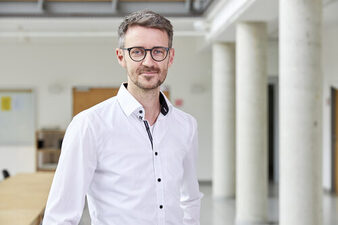Profile
The VR lab is part of the DMA Innovation Lab of the Digital Methods in Architecture(Opens in a new tab) teaching and research area at the Faculty of Architecture. Students have access to a learning lab for virtual reality (VR) and augmented reality (AR).
Location-independent teaching
VR applications make it possible to actually experience architectural and urban planning designs in three dimensions and walk through them virtually - both individually and in larger groups. Equipped with a sufficient number of mobile, non-computer-bound VR glasses (Quest/Quest 2), the VR lab allows innovative, location-independent concepts for teaching to be tested, further developed and established. Supervision and presentation of designs now take place regularly in virtual space, in the digital design models of students.
Future-oriented architecture education
Digital reality applications are a building block of digitalization in the construction industry. A wide variety of VR and AR applications are becoming increasingly important in the communication of architectural and spatial concepts as well as in construction practice. In the VR learning lab, students can learn how to use the hardware and software and develop and test their own solutions. This enables us to adequately prepare our students for this (new) working practice and familiarize them with the possibilities and limitations of virtual and augmented reality.
Innovative design approaches
Digital modeling strategies can be used to design interactively within an immersive, virtual environment. Digital modeling tools allow countless design iterations to be run through with little effort and adapted immediately. VR technology allows the design variants to be experienced directly in three dimensions in order to assess them aesthetically/formally and functionally. The combination of digital modeling tools with powerful, stationary (computer-based) VR technology promises a truly interactive spatial design experience. This potential, which has not yet been fully exploited in architectural design theory, is being experimented with in the VR laboratory.
Designed as an explicit learning lab, the VR lab offers students space to test and (further) develop their own approaches to immersive and interactive display, viewing and collaboration solutions and strategies.



